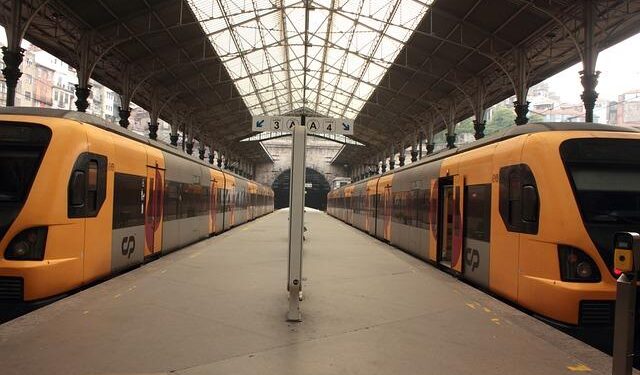In the bustling urban landscape of Bogotá, Colombia, the need for sustainable infrastructure has never been more pressing. With its rapidly growing population and increasing traffic congestion, the city’s Mass Rapid Transit System (MRT) emerges as a beacon of hope for enhancing public mobility while minimizing environmental impact. the International Institute for Sustainable Development (IISD) has recently published a extensive asset valuation report that evaluates the MRT system not just in terms of financial metrics, but also through the lens of sustainability. This report delves into the economic, environmental, and social impacts of the MRT, providing a nuanced understanding of its role in fostering a more resilient and equitable urban ecosystem. As cities worldwide grapple with the challenges of climate change and urbanization, Bogotá’s approach to public transportation offers valuable insights into how sustainable asset valuations can inform policy decisions and drive positive change.In this article, we explore the key findings of the IISD report and discuss the implications for Bogotá’s future and for urban transit systems globally.
Understanding the Economic and Environmental Impact of Bogota’s Mass rapid Transit System
The development of Bogota’s mass rapid transit system has far-reaching economic and environmental implications that extend beyond mere transportation efficiency. Economically, the system has the potential to create thousands of jobs through its construction and operation phases. Additionally, it stimulates local businesses as it enhances accessibility, ultimately leading to increased commerce in neighborhoods adjacent to transit stations. The reduction of traffic congestion can also lead to a meaningful decrease in commuting costs for residents,ultimately improving the overall quality of life in the metropolitan area. By connecting underserved regions to economic opportunities, the transit system fosters equity and inclusivity, making strides towards the city’s sustainable development goals.
On the environmental front,the implementation of a mass rapid transit system presents a pivotal possibility to curtail greenhouse gas emissions,contributing to a more sustainable urban ecosystem. By minimizing reliance on private vehicles, the system plays a crucial role in reducing traffic pollution and energy consumption. The following factors highlight the environmental benefits of Bogota’s transportation network:
- Decreased Air Pollution: Lower vehicle emissions lead to improved air quality.
- Energy Efficiency: Public transit systems utilize energy resources more effectively.
- Preservation of Green Spaces: Reduced need for extensive road infrastructure allows for more parks and recreational areas.
Moreover, the integration of green technologies, such as electric buses and solar-powered stations, amplifies the sustainability message within the transport sector. A well-planned rapid transit system not only addresses immediate transportation needs but also strengthens the long-term environmental resilience of Bogota.

Evaluating the Social Benefits of Sustainable Transportation in Urban Areas
the implementation of a comprehensive mass rapid transit system in Bogotá serves as a prime example of how sustainable transportation can enrich urban life.by enhancing accessibility, the transit system fosters social inclusion by offering reliable transportation options to marginalized communities. This system reduces travel times and associated stress, promoting better mental health and overall well-being among residents. The tangible benefits can be observed through various indicators,such as increased employment opportunities and improved access to education,leading to a more equal society. furthermore, the reduction of traffic congestion results in cleaner air, directly impacting public health positively.
Along with the immediate social advantages, the mass rapid transit system stimulates economic growth by attracting investments in nearby infrastructure and commercial developments. Triumphant transit-oriented projects often lead to increased foot traffic, wich benefits local businesses and enhances overall urban vitality. Metrics such as increased property values and tax revenues illustrate the economic ripple effect of a robust transportation network. A detailed assessment of these benefits can be captured through the following table:
| Impact Area | Description |
|---|---|
| Accessibility | Improved access to jobs and services for vulnerable populations. |
| Health | Reduction in vehicular emissions contributes to better public health outcomes. |
| Economic Development | Attraction of businesses leads to job creation and enhanced urban life. |

Analyzing the Role of Public-Private Partnerships in Enhancing Transit Sustainability
Public-private partnerships (PPPs) have emerged as a pivotal strategy in shaping the landscape of sustainable transit systems worldwide, and Bogotá’s Mass Rapid Transit System (MRTS) stands as a testament to this trend. By leveraging the expertise and resources of both the public and private sectors, these partnerships aim to optimize service delivery while minimizing environmental impact. Key elements include:
- Shared Investment: Joint funding mechanisms distribute financial risks and responsibilities, encouraging the private sector to invest in infrastructure projects that align with public goals.
- Innovative Solutions: Collaboration fosters innovation, with private entities introducing cutting-edge technologies and practices that enhance operational efficiency and user experience.
- Responsive Management: flexible partnerships allow for adaptive management practices,ensuring that transit services evolve in line with user needs and sustainability targets.
The integration of sustainable practices in transit planning through PPPs also promotes broader environmental and social benefits.For instance, a structured valuation of the assets within the MRTS framework allows stakeholders to understand the long-term impacts of their investments. A brief analysis reveals:
| Sustainable Aspect | Potential Benefits |
|---|---|
| Reduced Carbon Emissions | encourages usage of public transport over private vehicles |
| Land Use Optimization | Enhances urban planning and reduces transit times |
| Community Engagement | Incorporates public feedback into transit development projects |
As cities like bogotá navigate the complexities of urban mobility in an era marked by climate change and population growth, the role of public-private partnerships will be crucial in crafting transit systems that are not only efficient and effective but also sustainable and resilient.

Recommendations for Policy Makers to Strengthen Sustainable Asset Valuation Practices
To enhance sustainable asset valuation practices, policy makers should consider integrating a multi-dimensional approach that encompasses environmental, social, and economic factors. This entails developing a robust framework that encourages the inclusion of non-market values such as ecosystem services, community well-being, and cultural heritage in valuation methodologies. By utilizing innovative assessment tools like participatory valuation techniques, they can engage local communities and stakeholders, ensuring that their voices and concerns are reflected in the decision-making process. Furthermore, implementing standardized metrics for sustainability across all assessments will facilitate better comparison and benchmarking, driving more informed investment decisions.
Investment in capacity building is crucial for fostering a culture of sustainable valuation. Policy makers should prioritize training programs aimed at enhancing the skills of urban planners, engineers, and financial analysts in sustainable asset assessment. This can be achieved through workshops, seminars, and collaboration with academic institutions focused on environmental economics. Additionally, creating a centralized knowlege hub would allow for the sharing of best practices, case studies, and innovative methodologies across jurisdictions.Such initiatives will cultivate a more informed workforce capable of implementing sustainable practices, ultimately contributing to the resilience and sustainability of urban infrastructure like Bogotá’s Mass Rapid Transit System.

Strategies for Community Engagement in the Future of Bogota’s Transit System
engaging the community in the conversion of Bogota’s transit system is crucial for fostering a sense of ownership and ensuring the system meets the needs of its users. Effective strategies should focus on inclusive dialog that encompasses a diverse range of stakeholders, including residents, local businesses, and civic organizations. By adopting a collaborative approach, authorities can implement initiatives such as:
- Public Workshops: Holding interactive sessions that allow community members to voice their opinions and suggest improvements.
- Online Platforms: Developing user-pleasant digital tools for residents to share feedback and track the impact of proposed changes.
- Community Partnerships: Collaborating with local organizations to reach underrepresented groups and gather diverse perspectives.
Furthermore, continuous engagement can enhance user experience and system sustainability. Integrating community input can lead to innovations like flexible route designs and real-time service updates, making the transit system more responsive to users’ evolving needs. To facilitate this ongoing dialogue, the establishment of a Community Transit Advisory Board could serve as a permanent forum for discussion, providing a structured avenue where community representatives can regularly meet with transit planners and city officials. Below is a simple table illustrating the potential structure and roles within such a board:
| Role | Description |
|---|---|
| Community Representative | A voice for local residents, sharing experiences and concerns. |
| Transit authority Official | Bridges the gap between the community’s needs and transit planning. |
| Local Business Owner | Provides insights on economic impacts and commuter behaviors. |
| Urban Planning Expert | Offers technical guidance on best practices and innovative concepts. |
Lessons Learned from Global Best practices in Sustainable Urban Transit Solutions
The exploration of sustainable urban transit solutions across the globe has revealed several key insights that can be applied to improve the Mass Rapid Transit (MRT) system in Bogotá, Colombia. One vital lesson is the importance of integrating multimodal transportation networks to enhance accessibility and reduce reliance on individual vehicles. Cities like Amsterdam have successfully implemented such systems,offering seamless connections between tram,bus,and cycling routes,which not only alleviates congestion but also promotes environmentally friendly commuting options. Furthermore,community engagement has emerged as a cornerstone of successful transit initiatives,fostering public buy-in and ensuring that the solutions cater to the actual needs of users. Involving local stakeholders from the planning stage can significantly enhance the relevance and effectiveness of transit systems.
additionally, the adoption of innovative financing models has proven beneficial in various cities. The experiences of cities such as singapore show that leveraging both public and private investments can lead to sustainable funding mechanisms for transit projects.By establishing partnerships with private sector players, Bogotá can ensure ongoing financial support for maintenance and expansion efforts. Furthermore, incorporating smart technologies into transit operations, as seen in cities like Barcelona, can dramatically improve efficiency and user experience. Real-time data collection and analysis enable better route planning and management, minimizing delays and optimizing service. As Bogotá seeks to enhance its MRT system, these global practices offer a wealth of strategies that can be tailored to local contexts, fostering a more sustainable urban transit future.
In Conclusion
the sustainable asset valuation of Bogota’s Mass Rapid Transit system represents a significant advancement in urban transport planning and environmental accountability. By applying innovative valuation techniques, this initiative not only quantifies the economic and social benefits of the transit system but also underscores the importance of integrating sustainability into infrastructural development. The findings of this report shed light on the potential for enhanced policymaking in Bogota and similar urban contexts, highlighting the necessity for a holistic approach that considers long-term environmental, social, and economic impacts. As cities worldwide grapple with the challenges of urbanization and climate change, initiatives like this pave the way for responsible investment and sustainable urban development. The future of mass transit in Bogota serves as a critical benchmark for other metropolitan areas aiming to achieve a balance between growth and sustainability.















